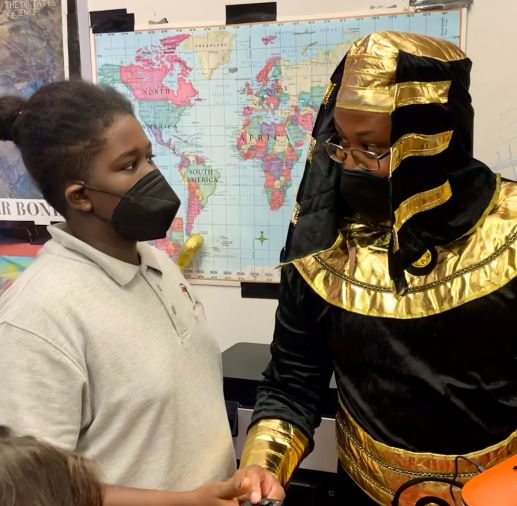We sat down with a few of our longtime African American faculty members to reflect with them about their experiences at Washington Latin as teachers, and how their identity and personal experiences have helped inform and inspire their practice in and out of the classroom.
Reading specialist Brittany Lee-Bey applied to Washington Latin in 2016 after meeting some of our high school students on a Learn and Serve trip to Zambia. She was inspired by the analytical and creative way these Latin students spoke and wrote. “I liked how they seemed like thinkers who thought deeply about what they were there for,” Ms. Lee-Bey said. Though Ms. Lee-Bey had originally considered going to law school after majoring in government and black studies at William & Mary, she was motivated by the desire to share her love of reading with children. Ms. Lee-Bey was particularly taken by the school’s focus on literacy when she was first interviewed. After learning about Dr. Diana Smith’s decision to obtain an additional adolescent literacy certificate after completing her doctorate at UVA, Ms. Lee-Bey was inspired to complete a second master’s degree in reading instruction there as well. The chance to share the work of diverse authors with students has always been an area of joy for Ms. Lee-Bey. Right now she is reading the book Patina by Jason Reynolds in her sixth grade class. “I want to inspire my students to read by seeing themselves in the texts. Having these conversations about cultural nuances has been great, and I didn’t feel like I had those kinds of conversations as a student growing up in Fairfax County.”
Seventh grade history teacher Mr. Wills joined the school in 2015, but was already familiar with some of the long-time Latin teachers. He had taken a summer course at Ford’s Theater on the Civil War with former eleventh grade history teacher Tom Hagerty and had actually taught fifth grade science teacher Ebony Dorsey’s older sister, who was a 6th grader at Nannie Helen Burroughs Elementary at the time. “I met Ebony Dorsey, when she was in 3rd grade,” remembers Mr. Wills. “She would come into my classroom and read the books. I recognized her and I remembered her when I joined the school though I had not seen her for so many years.” Mr. Wills, a native of Washington, D.C., says his own personal experiences in local public schools and his Philosophy major as an undergraduate at Catholic University inform his practice as a teacher. “My own personal journey helps me connect to people I embraced as role models,” said Wills. “People like Henry Louis Gates, Martin Luther King, Cornel West, and jazz musicians like Duke Ellington.” He is also inspired by his parents’ work in local civic organizations to integrate his childhood neighborhood of Hillcrest. “They taught my brother and I the importance of service, of being an engaged citizen, of respecting the laws of the country. They also taught us how to protest in a positive and nonviolent way, so that people will listen to you,” recalls Mr. Wills, who tries to share the same message with his students.
Sixth grade civics teacher and history department chair, Lawrence Staten, was also drawn to Latin by his personal background in classical education and his commitment to the community. Staten attended St. Paul’s School in Baltimore where he learned the Socratic method and then majored in political science, astronomy, and theater at Vanderbilt. He learned about Latin from family friend and former head of school Martha Cutts, and joined the school in 2010. After working on two federal political campaigns, and as a lobbyist and a public policy researcher, he feels that the classroom at Latin allows him to combine his interest in history with his flair for the dramatic. “I take a great deal of joy in bringing history to life for students who never had the experience before,” says Staten. “Latin allows me to bring my authentic self to the classroom. One of the things I try to focus on is how African history and African American history is a core part of history itself. We start our [6th grade Civics] course by looking at the origins of civilization in Africa, and weave the narrative throughout history, about the role of the Islamic empires and how they saved the classical traditions after the fall of Rome. It shouldn’t be siloed to the month of February, it needs to be constantly told throughout the academic year.”
Valete!
Head of School

